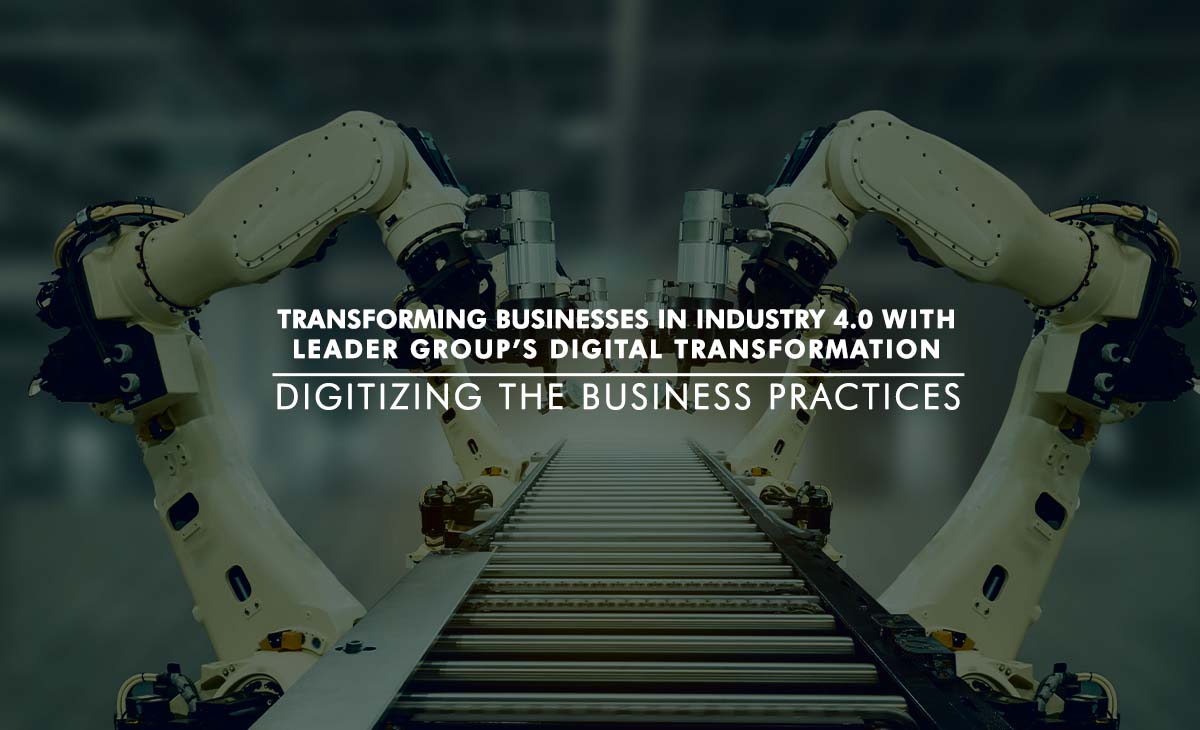
Transforming Businesses in Industry 4.0 with Leader Group’s Digital Transformation: Digitizing the Business Practices
“Digital transformation is not just about transforming the business practices digitally; but also about creating a digital environment across the business by redefining the business processes and creating a digital customer experience. Leader’s pragmatic consultation to digital transformation has it all.”
Digital transformation refers to the process of embedding digital tools to enable digitized business practices, thereby transforming a business into a digitally-driven business.
Digitization and digitalization are used interchangeably but are distinct in many ways.
Digitization refers to converting physical assets, audio, and video into digital signals, codes, and information ready for computers and other digital tools and converted into digitally driven tools and processes.
Digitalization is a broader spectrum that entails the usage of digitally transformed business practices by organizations to achieve their desired business goals and objectives.
Digitization and digitalization form the core of any business practice these days.
As digital transformation is the new normal in these uncertain times, going digital and adopting digitized business practices makes businesses more efficient.
However, many organizations still shy away from investing not digital tools and adapting to digitized business practices, lagging them behind the competition.
Digitalization – The Future:
Digitization embeds software to drive business growth. Most larger organizations rely on enterprise software solutions that enable them to operate their businesses digitally.
According to Gartner, the enterprise software market will be worth approximately USD 634 Billion by the end of 2023.
This high figure surge in the enterprise software market results from a rise in digitized business practices among organizations.
Furthermore, the rise in competition among the corporates is also driving the digital transformation among organizations.
The lack of confidence to invest in digital tools abruptly remains a challenge in the Digitalising process.
Still, the incredible results with unparalleled Digitalization make the digitization and digitalization processes even smoother.
Moreover, Leader Group’s pragmatic approach to digital transformation is smoother than others.
It also uses digital technology to develop new business or adapt existing business processes, culture, and consumer experiences that lead to digital transformation.
Such a set of business practices in the new digital age is called Digital Transformation.
Leader’s consultation on digitalization leads to the fusion of online and offline, disruptive technologies, and the radical change of entire industries.
Its consultation with Digitalisation relies on three key factors, namely People, Processes, and Technology.
People:
Before digitizing any business practice, it is imperative to understand the people of that organization.
People form the core of any organization, forming the essential culture of carrying out business practices.
Hence, to achieve a Digitized environment, it is essential to invest in people before investing in business processes.
Understanding the people and the way of doing business makes digitization easier.
Process:
Every business has a different process to carry out its business practices.
Some follow the traditional BCP’s (business continuity plans) to run their business practices, while some adapt to new innovative ways to enable a business to achieve its goals and objectives.
Understanding an organization’s process is critical in attaining a digitally transformed business environment.
Technology:
Technology defines the scope of digitalization.
The data, system, and technology result in a digitally-driven environment, thus creating value by deriving insights from a particular technology that leads to digital transformation.
Thus, identifying the technology and assessing its costs against its benefits improves investing in technology to achieve digital transformation.
Core Initiatives of Digital Transformation:
Leader’s Six-Core initiatives of Digital Transformation Services are listed below, which helps in achieving digital transformation smoothly and makes Leader stand out among other competitors.
Digital Customer Experience:
Turning customer insights into business value leads to customer satisfaction. Achieving customer delight that exceeds expectations leads to improved business performance and a digital environment.
A digital customer experience enables customer-centric business practices that derive profitable business practices and lead to digital transformation.
Digital Organization:
Digital transformation services work efficiently in the digital workspace, and hence having a digital organization eases the transformation.
A digital organization uses tools, data, technology, and processes that smoothes the digital organization’s business practices.
Business Analytics and Data Science:
Leader Group’s Business Analytics focuses on the statistical study of business data.
However, it combines traditional analytics practices with software knowledge.
Digital Business Design:
Leader Group’s Digital Business design focuses on adopting digital technologies’ business, operational, financial, and strategic implications by embracing digital change.
Also, Leader Group envisions a step-change in business and operational models to achieve digitally-driven business practices.
Digital Technology Strategy:
Digital technology strategy uses digital technologies to business models and forms new differentiating business capabilities.
Leader Group ensures that technology strategy supports organizations’ digital systems, leading to digitalization.
Governance, Risk, and Compliance:
Managing governance, risk, and compliance has become crucial to achieving digital transformation.
Complying with governance, risks, and compliance is essential for any organization to drive maximum results.
Leader Group ensures a structured approach that aligns IT with business objectives while effectively managing risk and meeting compliance requirements.
As a result, the Leader Group protects organizations’ brands, reputations, and customers from regulatory or security breaches.
Conclusion:
Finally, Digital is the new normal, and digital transformation is here to stay.
Organizations that leverage digital transformation benefits will find it easy to navigate the business challenges and stand out among competitors.
In contrast, the ones who remain vulnerable in investing in digitalization will find it difficult to survive in the longer run.
Above all, Leader’s pragmatic approach to digitalization streamlines the business processes, making them scalable and ensuring a digitally-driven business environment.





